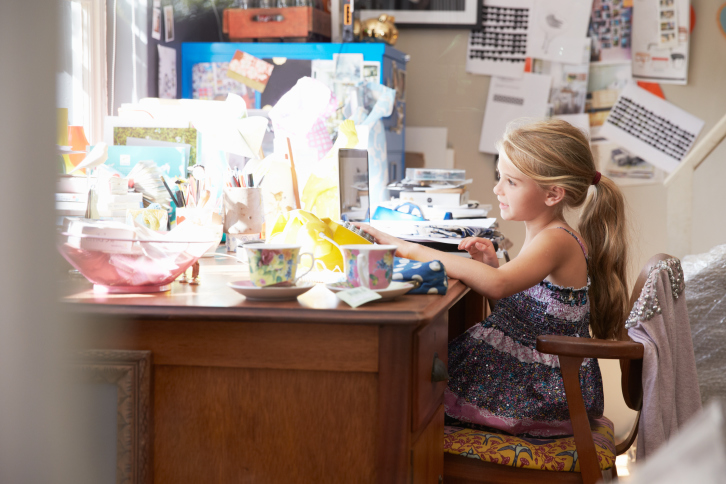
Parents don’t usually post pictures of their kids on the second day of school.
That made me consider taking another set of pictures this year, one at about 6:30 PM every evening on that first week to show a side of our family that we may not be particularly excited to display.
Maybe it sends a more powerful message when we elevate those moments, too. We can show we are fond of them, fighting for them when we aren’t afraid to let the reality of the second day or the third or the twentieth day of school be truly known. I want my kids to know the messier things matter to me, and I’m not just proud of their good days, but proud of them on the days they struggle too.
Both of my kids came home after the first day of school completely happy, excited, and amped to do homework. Strange. But it’s true. It only took a few hours for the hangry-anxious-tension to surface.
Their first day of school photo says, “I’m happy, excited, and put together.”
We post it online like good parents and we affirm that we’re so proud of them for having it all right on the first day.
What they don’t see are the pictures of themselves and other kids with parents saying, “Look how messy life is now that school started and how much I love this kid who was courageous enough to face the things she feared.” I mean, why don’t we take a photo of the pile of papers on our counter and the lost shoe and the one piece of homework that no one in your family can understand, including the dog?
On the day after our successful first day of school, I saw an opportunity to tell my kids a different kind of story.
Our oldest lost her mind over her sister being in front of her on the bicycle during our evening bike ride. Our youngest flipped out because she doesn’t like the feeling of a shirt tucked in.
Here’s where I saw a chance to fight for their hearts, to exchange the “Everything is okay, you will be okay, you’re just tired, it’ll be better in the morning” conversation with another one:
“You know, I hear you. I love you. You’re mad, and your pain matters to me. You don’t have to be that smiling girl all of the time. I respect that, but let me help you work though it. Let me help you by showing you how fond I am of you even in the tougher moments.”
Kids need to know that fondness and admiration for them doesn’t diminish when the emotional wheels fall off. And they also need us to seek to know the real struggle that may be going on underneath.
Once we started talking and listening to our kids, my husband and I began to see other things going on under the surface.
For my oldest, her emotion really wasn’t about being first in a road race. It was more about not getting the teacher she had wanted. It was a big deal to her and she was hurt. She wrote in her notebook “never in my entire life will I have the chance to have Ms. Solano again.”
For my youngest, the shirt probably was a little scratchy. It was new and so were the shorts and the whole belt situation. Then, we threw her into a brand new Kindergarten environment where managing all of the new things is up to her. We are learning when she’s mad about how something feels, it’s usually because she is afraid of something else. She was worried she may not be able to go potty with her shirt tucked in, so she didn’t go the whole day.
As dramatic as they may seem, the pain of a kid’s moment is worth the inconvenience we feel when we help them work through it. That willingness leads to feelings of safety, stability, and love.
As parents, we have the opportunity to encourage and embrace our children in the middle of their messes and show them the love of God
So, what can we do to fight for their hearts this year?
- Start by taking pictures of them during the messy moments. Even if they are simply mental snap shots of the moments when you were proud of them for persevering through something “awful” “stressful” or “painful”.
- Tell a story of resilience and bravery that you’ve observed about them while they are going through something stressful.
- Show how fond you are of them, regardless of the circumstances they are in, by telling them what you like about them often.
- Give positive feedback about the future. Even though something may have happened in the past, it doesn’t have the right to control their future. Help them tell a new story.
- Have a sense of humor as a family when the wheels fall off. Take a photo of the laundry pile. Laugh when the cereal box empties on the floor. Find grace in the imperfections and throw it around like confetti.
- Brag that you get to be their parent. Tell them it feels good to have a kid who trusts you with all of their life, not just the good parts but the more difficult parts too.
Fight for their hearts on special days, and every day in between. Their hearts will thank you. Maybe not today, maybe not next week, but one day when they get through something tough and they remember how you showed them the way, they might look up and say “thank you, thank you for fighting for my kid heart because it’s helped my adult heart have a lot of hope.”





